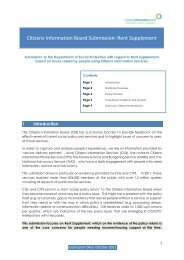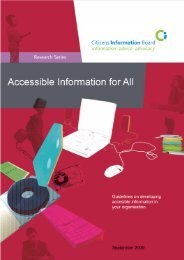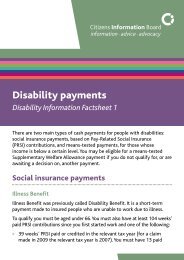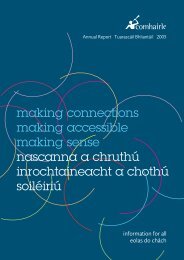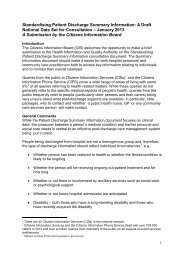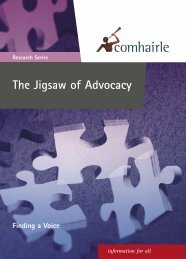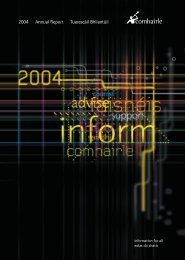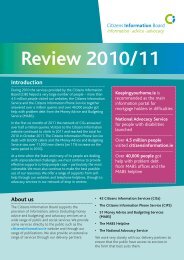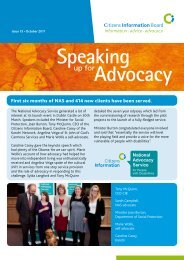Review of Sign Language Interpretation Services and Service ...
Review of Sign Language Interpretation Services and Service ...
Review of Sign Language Interpretation Services and Service ...
- No tags were found...
Create successful ePaper yourself
Turn your PDF publications into a flip-book with our unique Google optimized e-Paper software.
5.3.1 Population distributionMost <strong>of</strong> the countries chosen for this review have a similar population distributionto Irel<strong>and</strong>. New Zeal<strong>and</strong>, Finl<strong>and</strong> <strong>and</strong> Scotl<strong>and</strong> all have SLI resourcesconcentrated in city centres <strong>and</strong> experience difficulties in meeting the needs <strong>of</strong>Deaf people in rural areas. Deaf people tend to gravitate towards centres wherethere are SLI services <strong>and</strong> this can result in a reduced level <strong>of</strong> service for thosewho remain in isolated rural areas. In New Zeal<strong>and</strong> approximately 65% <strong>of</strong> theinterpreters are based in one city with virtually none outside <strong>of</strong> the four mainpopulation centres.Given the shortage <strong>of</strong> interpreters <strong>and</strong> the free-market nature <strong>of</strong> much <strong>of</strong> theprovision, it is difficult to influence the distribution <strong>of</strong> interpreters. For example,funding is available to employ BSL/English Interpreters in the Scottish Highl<strong>and</strong>sbut few interpreters are willing to move there <strong>and</strong> others resist travelling longdistances when there is more than enough work in the urban centres <strong>of</strong> Glasgow<strong>and</strong> Edinburgh. Some <strong>of</strong> the Scottish local authorities have funded individuals toundergo interpreter training in order to build up local SLI resources but thesemeasures have had limited success.In an attempt to address this ongoing problem <strong>of</strong> rural access, attention is nowbeing turned towards the application <strong>of</strong> new technologies, especially in theprovision <strong>of</strong> remote interpreting using broadb<strong>and</strong> internet access. This isdescribed more fully in Section 5.4 <strong>of</strong> this chapter.5.3.2 Top-down <strong>and</strong> bottom-up delivery <strong>and</strong> organisation <strong>of</strong> SLI servicesDenmark, Finl<strong>and</strong> <strong>and</strong> New Zeal<strong>and</strong> have adopted a national or top-downapproach to the provision <strong>of</strong> SLI services. All three have regional centres thatact as a central point <strong>of</strong> contact for dealing with interpreter bookings. InNew Zeal<strong>and</strong>, the Deaf Association <strong>of</strong> New Zeal<strong>and</strong> <strong>of</strong>fers an interpretingservice through its twelve regional <strong>of</strong>fices. In Denmark, the Centre for theDeaf administers SLI services in four regions. Finl<strong>and</strong> has 20 regional centresdelivering SLI services. These services can act closely in accordance with nationalstrategy. However, there can be disadvantages with this national structure.Where it can become more difficult to accommodate local priorities, there is lesscommunication with the local Deaf community, <strong>and</strong> the organisation is moredriven by central government priorities. Those countries which follow thisstructure seem to have more uniformity <strong>and</strong> consistency in provision across thecountry. Where the national top-down influence is strong (reflecting the prioritygiven to SLI services), there are also likely to be more trained interpreters.In other countries, SLI services have been developed from the bottom-up,reflecting local priorities <strong>and</strong> in response to local need. SLI services may beprovided by local deaf organisations, by local authorities, or private businesses. InScotl<strong>and</strong>, a number <strong>of</strong> local societies for the Deaf now employ their owninterpreters. In other areas, local authorities have set up SLI services providingfree interpreting for the services provided by their own departments <strong>and</strong> chargingother users. Some areas are served by private sector interpreting services such asClarion <strong>and</strong> <strong>Sign</strong> Solutions in Engl<strong>and</strong>. Where there are areas without interpretingpage 90 • <strong>Review</strong> <strong>of</strong> <strong>Sign</strong> <strong>Language</strong> <strong>Interpretation</strong> <strong><strong>Service</strong>s</strong> <strong>and</strong> <strong>Service</strong> Requirements in Irel<strong>and</strong>



